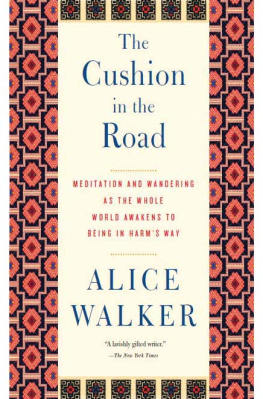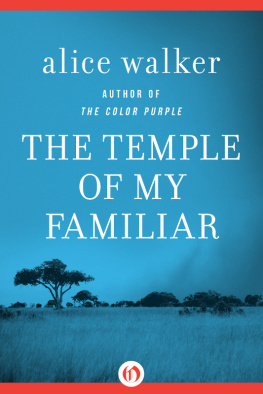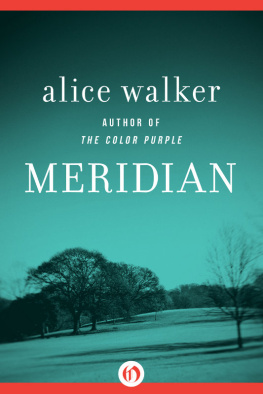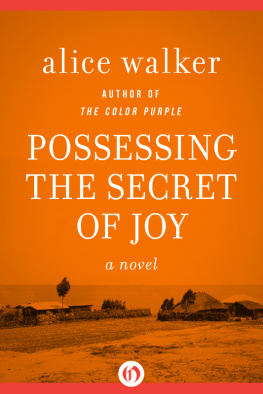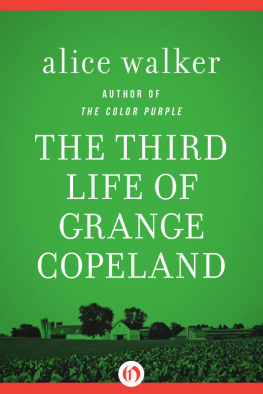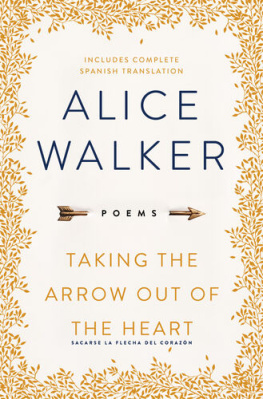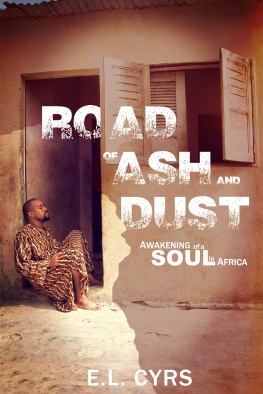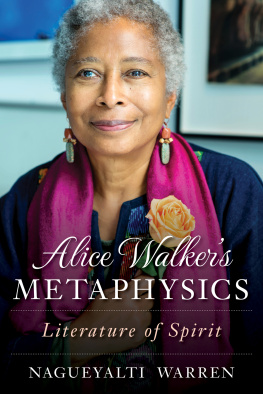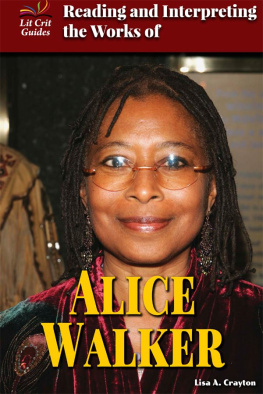THE CUSHION IN THE ROAD
ALSO BY ALICE WALKER
The Chicken Chronicles
The World Has Changed
We Are the Ones We Have Been Waiting For
The Third Life of Grange Copeland
The Temple of My Familiar
Possessing the Secret of Joy
Now Is the Time to Open Your Heart
Meridian
In Search of Our Mothers Gardens: Womanist Prose
The Color Purple
By the Light of My Fathers Smile: A Novel
Anything We Love Can Be Saved: A Writers Activism
THE
CUSHION
IN THE
ROAD
Meditation and Wandering
as the Whole World Awakens
to Being in Harms Way
ALICE WALKER

THE NEW PRESS
NEW YORK
2013 by Alice Walker
All rights reserved.
No part of this book may be reproduced, in any form, without written permission from the publisher.
Requests for permission to reproduce selections from this book should be mailed to: Permissions Department, The New Press, 38 Greene Street, New York, NY 10013.
Published in the United States by The New Press, New York, 2013
Distributed by Perseus Distribution
LIBRARY OF CONGRESS CATALOGING-IN-PUBLICATION DATA
Walker, Alice, 1944
[Essays. Selections]
The cushion in the road : meditation and wandering as the whole world awakens to being in harms way / Alice Walker.
pages cm
ISBN 978-1-59558-886-9 (e-book)
I. Title.
PS3573.A425C87 2013
814'.54dc23
2012041852
The New Press publishes books that promote and enrich public discussion and understanding of the issues vital to our democracy and to a more equitable world. These books are made possible by the enthusiasm of our readers; the support of a committed group of donors, large and small; the collaboration of our many partners in the independent media and the not-for-profit sector; booksellers, who often hand-sell New Press books; librarians; and above all by our authors.
www.thenewpress.com
Book design by Lovedog Studio
Composition by Westchester Book Composition
This book was set in Monotype Sabon
10 9 8 7 6 5 4 3 2 1
In honor of the lives of
Celia Snchez Manduley and Fidel Castro Ruz
revolutionaries, teachers, and spiritual guides who were,
as well, one of the most inspiring power couples
of the twentieth century.
CONTENTS
I thank Amy Goodman of Democracy Now! for being a fine leader in these challenging times. I thank Howard Zinn for being a mentor and inspiration especially to my teenage self; I miss you Howie. I thank Jack Kornfield, Pema Chodron, the Dalai Lama, and Amma for being models of mindfulness, courage, soulfulness, and persistence. You make the Universe a brighter place; it sings with you.
I thank my daughter, Rebecca Walker, for teaching me my own strength. I thank G. Kaleo Larson for loving our life together. I thank Charlie and Surprise and Miles, Ziggy, Otis, and Misty for showing me the delight and comfort of becoming a simpler part of the web of life. I also thank Emily Z.
I thank Julie Enzer, Julie McCarroll, Marc Favreau, and Maury Botton of The New Press for their care in preparing this book to reach its place in the world. With our words and work we are building a different and hopefully better world, guided by the belief that this is possible.
I thank my agent of forty years, Wendy Weil, who transitioned recently, for reading and loving this book and for finding a proper home for it. It is your voice, Wendy; that has not gone anywhere. I hear it still.
I thank Mexico and its people for reviving me, body and soul, time and time again. You are the best, regardless of Las Noticias.
THE CUSHION IN THE ROAD
I HAVE LEARNED MUCH FROM TAOIST THOUGHT; it has been a comfort to me since I read my first Taoist poem: Sitting quietly, doing nothing, spring comes, and the grass grows by itself. By Bash, I believe. But there is also, from that tradition, this thought: A wanderers home is in the road. This has proved very true in my life, much to my surprise. Surprise because I am such a homebody. I love being home with my plants, animals, sunrises and sunsets, the moon! It is all glorious to me. And so, when I turned sixty, I was prepared to bring all of my wandering self home to sit on my cushion, in a meditation room I had prepared long ago, and never really leave.
It so happened that I was in South Korea that year, and South Koreans agreed with me. In fact, in that culture it is understood that when we turn sixty we become eggy (it sounds like eggy, though perhaps this is not how Koreans spell it) and this means we are free to become once again like a child. We are to rid ourselves of our cares, especially those we have collected in the world, and to turn inward to a life of ease, of leisure, of joy. I loved hearing this. What an affirmation of a feeling I was already beginning to have: enough of the world! Wheres the grandchild? Wheres the cushion?
And so I began to prepare myself to withdraw from the worldly fray.
There I sat, finally, on a cushion in Mexico, with a splendid view of a homemade stone fountain, with its softly falling water a perfect, soothing backdrop to what I thought would be the next, and perhaps final, twenty years of my life.
And then, a miracle seemed to be happening. America was about to elect or not elect a person of color as its president. What? My cushion shifted minutely. Then too an unsuspecting guest left the radio on and I learned bombs were falling on the people of Gaza. A mother, unconscious herself, had lost five of her daughters. Didnt I have a daughter? Would I have wanted to lose her in this way? Wasnt I a mothereven if reportedly imperfect in that role? Well! My cushion began to wobble.
I had friends who became eggy and managed to stay eggy. I envied them. For me, the years following my sixtieth birthday seemed to be about teaching me something else: that, yes, I could become like a child again and enjoy all the pleasures of wonder a child experiences, but I would have to attempt to maintain this joy in the vicissitudes of the actual world, as opposed to the meditative Universe I had created, with its calming, ever flowing, fountain.
My travels would take me to the celebrations in Washington, D.C., where our new president, Barack Obama, would be inaugurated; they would carry me the morning after those festivities to far away Burma (Myanmar), which would lead to much writing about Aung San Suu Kyi. They would take me to Thailand, for a lovely trip up a long river, where I could wave happily at the people who smiled back when smiled upon! They would take me to Gaza, yes. And much writing about the Palestine/Israel impasse. To the West Bank, to India. To all kinds of amazing places. Like, for instance, Petra, in Jordan. Who knew? I would find myself raising a nation of chickens in between travels and visits to holy people in Kerala, Oakland, Woodacre, and Dharamsala. My cushion, the fountain, the peace, because of my attention to some of the deep suffering in the world, sometimes seemed far away.
I felt torn. A condition I do not like and do not recommend.
And then, in a dream, it came to me. There was a long asphalt highway, like the one that passed by my grandparents place when I lived with them as an eight- and nine-year-old. My grandfather and I would sit on the porch in the still Georgia heat and count the cars as they whizzed by. Hed choose red cars, I would choose blue or black. It was a sitting on cushions of sorts, I suppose, for the two of us, because hours could go by and we were perfectly content. Perhaps that is why, in the dream, the solution to my quandary was available. There, in the middle of the long, perfectly straight highway with its slightly faded yellow centerline, that I had known and loved as a child, sat my rose-colored meditation cushion. Directly on the yellow line, right in the middle of the road.
Next page
